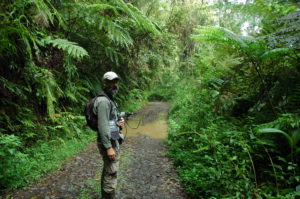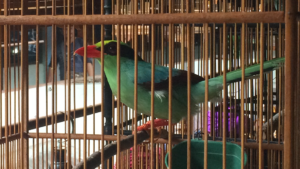| Applicant | Metropolitan University and Birdlife International |
| Project coordinators | Stuart Marsden, Nigel Collar |
| Location | West Java, Indonesia |
| Pledged amount | €36.000 |
| Flagship species | Javan green magpie (Cissa thalassina) – CR |
Project funding progress
The overexploitation of songbirds for the pet trade and singing competitions in Indonesia has involved the near-disappearance of two bird species endemic to Java’s montane forests, the Javan Green Magpie (Cissa thalassina) and Rufous-fronted Laughingthrush (Garrulax rufifrons), both of which are (a) classified as Critically Endangered on the IUCN Red List and (b) subject to intensive but small-scale captive-breeding programmes (led by EAZA’s Threatened Asian Songbird Alliance) to ensure that, if the species become extinct in the wild, populations are still available for reintroduction. The magpie has been recorded from a total of nine disjunct montane forest areas, while the laughingthrush has been recorded from the same nine forests but also three others.

Many of these forests have not been surveyed in the past half-century, although recent analysis of satellite images at Manchester Metropolitan University shows that all still exist (in varying degrees of condition). However, further analysis also shows that another eight forests (i.e. 20 in total) exist and require investigation. Such investigation is necessary for several reasons: first, it is vital to discover whether (and in what numbers) the two species survive in any of the forests, and second, if the species are gone, we need to determine how suitable the forests are for reintroduction purposes. Moreover, there are many other threatened species in West Java’s forests, including three primates, that also require urgent assessment and can be targeted during the survey work.

Project objectives:
- Undertake a systematic biological survey of the two most extensive forests (Gunung Halimun and Gunung Patuha) for all their threatened wildlife and all endemic bird species and their habitat preferences, using line transects and automatic acoustic recording technology
- Record key environmental parameters (area of different habitats, extent of primary forest, trapping and other anthropogenic pressures) to establish a modern baseline concerning forest condition and provide an index of their conservation value and potential
- Work with Indonesian partners – the BirdLife Affiliate (Burung Indonesia), government authorities and local communities – to determine the official protection status of the forests, the management regimes, and local attitudes to the forests and their wildlife
- Provide strong evidence-based recommendations for improved management (and conservation status) of both forests, especially around strongholds for key traded songbirds, or potential reintroduction sites.
PROJECT UPDATES:
September 2018 2018 Owen. Update Javan Mountain Survey. Athens
Summer 2019 Zooquaria_105_Summer_2019_Out_in_the_field

